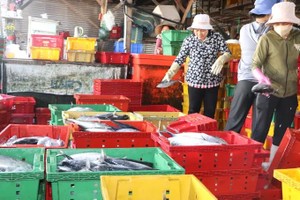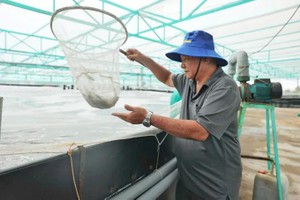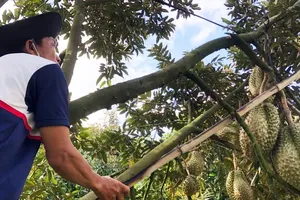
According to a report on the e-commerce field recently published by the Ministry of Industry and Trade, with 74 percent of people using the internet, Vietnam had about 59-62 million consumers shopping online in 2023. Moreover, each people spend about US$300-US$320 buying commodities from shops on e-commerce platforms. This number in 2022 was $288.
Over the past years, Vietnam's e-commerce has always maintained a growth rate of 16 percent to 30 percent, expected to reach $20.5 billion this year. However, shopping for items online can also have its pitfalls including an increased risk of fraud when more fake and counterfeit goods are displayed for sale on e-commerce platforms.
The General Department of Market Management under the Ministry of Industry and Trade said that in 2023, staff from the market surveillance agencies nationwide paid visits to 72,031 facilities for inspection discovering 52,390 cases of violation of counterfeit goods, imitation goods, and goods violating intellectual property regulation, an increase of 16 percent compared to 2022.
Noticeably, trading in fake and counterfeit goods such as cosmetics, household appliances, and electronics are increasingly complex and sophisticated in e-commerce platforms and major social networks such as Lazada, Shopee, TiKi, and Facebook.
Fraudsters often open promotional stalls and advertise genuine products to sell pirated and poor-quality goods and eliminate evidence very quickly, causing difficulties for management agencies.
Regularly buying items from online shops on e-commerce platforms, Ms. Do Thi Hanh in HCMC’s Phu Nhuan District agreed that online shopping is convenient for those who are busy. However, she said that online shoppers are facing potential risks such as product quality risk, and financial and non-delivery risks. She moaned that she spent VND2 million (US$81,945) buying cosmetic products from an e-commerce platform but all products were counterfeit goods.
Similarly, customer Tran Thien Vu in District 6 complained about sales of substandard commodities on e-commerce platforms. Scammers on these platforms even did not reply to her questions.
According to Ms. Phan Thi Viet Thu, Chairwoman of the Ho Chi Minh City Consumer Protection Association, consumers are currently encountering buying fake and poor-quality goods on online markets. This causes significant material damage to consumer confidence when shopping online.
She also pointed out the culprit of this problem - the lax management of responsible agencies and the inadequate refund policies of sales websites.
In particular, the association encounters many cases of buying fake and counterfeit goods, but because complaints take a lot of time and the value of the goods is not high, many people choose not to complain or give up halfway. According to lawyer Bui Thi Le Hang from the Ho Chi Minh City Bar Association, trading in counterfeit goods is an illegal act. Fraudsters will face administrative sanctions or criminal prosecution, confiscation of exhibits, revocation of business license or they are forced to return illegal profits and destroy counterfeit goods on the market.
























